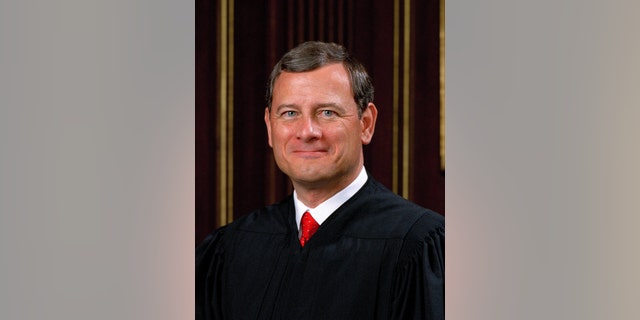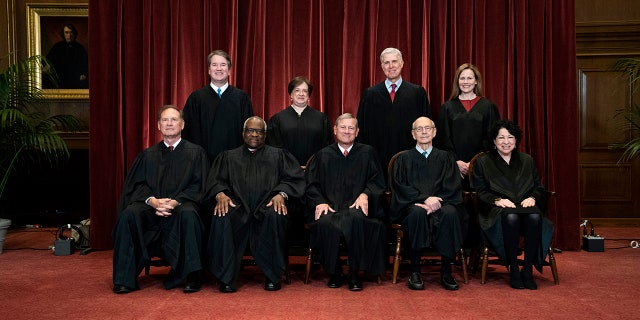Notable takeaways from the Supreme Court oral arguments on Mississippi’s abortion law
Former assistant U.S. attorney Andrew McCarthy and constitutional law professor Jonathan Turley provide reaction and analysis as the U.S. Supreme Court hears oral arguments in a case that challenges Roe v. Wade
The Supreme Court on Wednesday heard oral arguments in Dobbs v. Jackson Women’s Health, a case in which the State of Mississippi is asking the court to strike down a lower court ruling that blocked its 15-week abortion ban law from taking effect.
The case has implications for two longstanding Supreme Court precedents, Roe v. Wade and Planned Parenthood v. Casey, which have severely restricted when states can ban or limit abortions.
Oral arguments ended around noon Wednesday, with five key moments standing out.
1. Breyer asks why court should disregard ‘stare decisis’ to overrule Roe v. Wade
Justice Stephen Breyer asked Mississippi Solicitor General Scott Stewart, who was arguing the case for the State of Mississippi, why the Supreme Court should disregard “stare decisis,” a legal principle in which the court generally follows its previous rulings, by overturning Roe.

Stephen Parlato of Boulder, Colorado, holds a sign supporting abortion rights as anti-abortion activists stand behind him with sign outside the Supreme Court of the United States, Dec. 1, 2021 in Washington, D.C.
(Matt McClain/The Washington Post via Getty Images)
“They say it’s rare,” Breyer said. “They call it a watershed. Why? Because the country is divided, because feelings are running high, and yet the country, for better or for worse, decided to resolve their differences by this court, laying down a constitutional principle in this case.”
Stewart responded by saying that much has changed in the years since Roe was decided, arguing that states should be allowed to account for new developments.
“The last 30 years, workability, developments in the law, factual developments that states can’t account for,” Stewart said.
While the Supreme Court overturning its own precedent is rare, it has happened before. Perhaps the most famous example of overturned precedent was the 1954 Brown v. Board of Education ruling, which reversed Plessy v. Ferguson and ended segregation under a legal doctrine known as “separate but equal.”
2. Chief Justice Roberts frets about fate of other precedents if court overturns Roe
Chief Justice John Roberts perhaps signaled hesitation to overturn precedent, asking if overturning Roe would lead to more such decisions in the future.
“There are a lot of cases around the time of Roe, not of that magnitude, but the same type of analysis, that that went through exactly the sorts of things we today would say were erroneous,” Roberts said. “If we look at it from today’s perspective, it’s going to be a long list of cases that we’re going to say were wrongly decided.”
Stewart replied that “other controversial areas, or once-controversial areas, are quite settled, clear rules, and don’t have those considerations against them.”
SUPREME COURT ORAL ARGUMENTS IN DOBBS PROMPT STRONG REACTIONS FROM BOTH SIDES OF ABORTION DEBATE
The Mississippi solicitor general added that the court “won’t have to go down that road.”
3. Roberts questions why 15 weeks isn’t enough time to choose whether to abort a baby
But Roberts also questioned the lawyers arguing in favor of striking down the law why 15 weeks is not enough time for a woman to decide to have an abortion.
“If you think that the issue is one of choice — that women should have a choice to terminate their pregnancy — that supposes that there is a point at which they’ve had the fair choice, opportunity to choose,” Roberts said. “And why would 15 weeks be an inappropriate line? Viability, it seems to me, doesn’t have anything to do with choice. But if it really is an issue about choice, why is 15 weeks not enough time?”
Lawyer Julie Rickelman, who argued the case for Center for Reproductive Rights, countered that allowing the Mississippi law to stand would create a “slippery slope” that would lead states to pass even more restrictive abortion laws.

Official portrait of U.S. Supreme Court Chief Justice John G. Roberts.
“The state has conceded that some women will not be able obtain an abortion before 15 weeks, and this law will bar them from doing so,” she said. “Without viability, there will be no stopping point. States will rush to ban abortion at virtually any point in pregnancy.”
But Roberts noted that most countries ban abortions after 15 weeks, with the United States joining countries such as North Korea and China in permitting abortions later in pregnancy.
4. Alito grills pro-choice lawyer on validity of viability as line for abortion regulations
Justice Samuel Alito took aim at a pro-choice lawyer over whether viability was a logical legal threshold for when abortions should be prohibited.
LAWMAKERS REMAIN DIVIDED AS ROE V. WADE HANGS IN THE BALANCE AT SUPREME COURT
“What would you say to the argument that has been made many times by people who are pro-choice and pro-life, that the line really doesn’t make any sense — that it is, as Justice Blackman himself described it, arbitrary?” Alito asked Rikelman.
Alito noted that while a woman may still want to terminate a pregnancy after viability, a “fetus has an interest in having a life” both before and after.
“In some people’s view it doesn’t, your honor” Rikelman replied. “It is principled because in ordering the interests at stake, the court had to set a line between conception and birth.”
5. Kavanaugh, Breyer clash on Supreme Court precedent
Justices Brett Kavanaugh and Stephen Breyer had a heated exchange over whether the court should overturn precedent, with Kavanaugh citing examples of when the court has done so in the past and Breyer accusing Kavanaugh of making false equivalencies.
“History tells a somewhat different story, I think, than is sometimes assumed,” Kavanaugh said about stare decisis. “If you think about some of the most important cases in this court’s history … there’s a string of them where the cases overruled precedent.”
HAWLEY SAYS DEMOCRATIC RHETORIC AMID SUPREME COURT ABORTION HEARING ‘REALLY DANGEROUS’
“Brown v. Board outlawed separate but equal,” he continued. “Baker v. Carr, which set the stage for one person, one vote. West Coast Hotel, which recognized the state’s authority to regulate business. Miranda v. Arizona, which required police to give warnings … about the right to remain silent. … Lawrence v. Texas said that the state may not prohibit same-sex conduct. Mapp v. Ohio, which held that the exclusionary rule applies to state criminal prosecution.”

Members of the Supreme Court.
(Erin Schaff/The New York Times via AP, Pool, File)
CLICK HERE TO GET THE FOX NEWS APP
Kavanaugh noted that some of those cases were “of the most consequential and important in the court’s history,” yet “the court overruled precedent.”
“They do not include the list that Justice Kavanaugh had here. … There are complex criteria that she’s talking about that link to the position in the rule of law of this court,” Breyer said a few minutes later. “All I would say is you have to read them before beginning to say whether they are overruling or not overruling in the sense meant there calling for special concern.”
With oral arguments out of the way, a decision on the case will likely come in the spring.
Many analysts believe the case is the most consequential abortion litigation in over 40 years, putting the fate of Roe in the hands of a Supreme Court that has undergone enormous changes and currently sits at a 6-3 conservative majority.



Comments